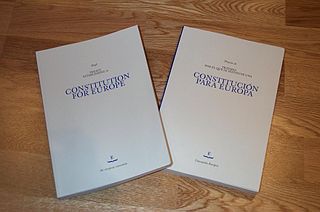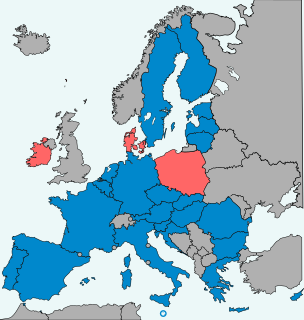
The Council of the European Union, often referred to in the treaties and other official documents simply as the Council, and informally known as the Council of Ministers, is the third of the seven Institutions of the European Union (EU) as listed in the Treaty on European Union. It is one of three legislative bodies and together with the European Parliament serves to amend and approve the proposals of the European Commission, which holds legislative initiative.

The European Union (EU) is a political and economic union of 27 member states that are located primarily in Europe. Its members have a combined area of 4,233,255.3 km2 (1,634,469.0 sq mi) and an estimated total population of about 447 million. The EU has developed an internal single market through a standardised system of laws that apply in all member states in those matters, and only those matters, where members have agreed to act as one. EU policies aim to ensure the free movement of people, goods, services and capital within the internal market; enact legislation in justice and home affairs; and maintain common policies on trade, agriculture, fisheries and regional development. Passport controls have been abolished for travel within the Schengen Area. A monetary union was established in 1999, coming into full force in 2002, and is composed of 19 EU member states which use the euro currency. The EU has often been described as a sui generis political entity.

The European Parliament (EP) is one of three legislative branches of the European Union and one of its seven institutions. Together with the Council of the European Union, it adopts European legislation, commonly on the proposal of the European Commission. The Parliament is composed of 705 members (MEPs). It represents the second-largest democratic electorate in the world and the largest trans-national democratic electorate in the world.

The European Council is a collegiate body that defines the overall political directions and priorities of the European Union. It comprises the heads of state or government of the EU member states, along with the President of the European Council and the President of the European Commission. The High Representative of the Union for Foreign Affairs and Security Policy also takes part in its meetings. Established as an informal summit in 1975, the European Council was formalised as an institution in 2009 upon the entry into force of the Treaty of Lisbon. Its current president is Charles Michel, former Prime Minister of Belgium.

The Convention on the Future of the European Union, also known as the European Convention, was a body established by the European Council in December 2001 as a result of the Laeken Declaration. Inspired by the Philadelphia Convention that led to the adoption of the United States federal Constitution, its purpose was to produce a draft constitution for the European Union for the Council to finalise and adopt. The Convention finished its work in July 2003 with their Draft Treaty establishing a Constitution for Europe. See History of the European Constitution for developments after this point.

The Treaty on European Union (2007) is one of the primary Treaties of the European Union, alongside the Treaty on the Functioning of the European Union (TFEU). The TEU forms the basis of EU law, by setting out general principles of the EU's purpose, the governance of its central institutions, as well as the rules external, foreign and security policy.

The Treaty establishing a Constitution for Europe was an unratified international treaty intended to create a consolidated constitution for the European Union (EU). It would have replaced the existing European Union treaties with a single text, given legal force to the Charter of Fundamental Rights, and expanded Qualified Majority Voting into policy areas which had previously been decided by unanimity among member states.

The Charter of Fundamental Rights of the European Union (CFR) enshrines certain political, social, and economic rights for European Union (EU) citizens and residents into EU law. It was drafted by the European Convention and solemnly proclaimed on 7 December 2000 by the European Parliament, the Council of Ministers and the European Commission. However, its then legal status was uncertain and it did not have full legal effect until the entry into force of the Treaty of Lisbon on 1 December 2009.

A European Commissioner is a member of the 27-member European Commission. Each member within the Commission holds a specific portfolio, and the Commission is led by the President of the European Commission. In simple terms they are the equivalent of national ministers.

The politics of the European Union are different from most other polities and states due to the unique nature of the European Union. The EU is similar to a confederation, where many policy areas are federalised into common institutions capable of making law; the competences to control foreign policy, defence policy or the majority of direct taxation policies are mostly reserved for the twenty-seven state governments. These areas are primarily under the control of the EU's member states although a certain amount of structured co-operation and coordination takes place in these areas. For the EU to take substantial actions in these areas, all Member States must give their consent. Union laws that override State laws are more numerous than in historical confederations; however the EU is legally restricted from making law outside its remit or where it is no more appropriate to do so at a state or local level (subsidiarity) when acting outside its exclusive competencies. The principle of subsidiarity does not apply to areas of exclusive competence.

The European Union adopts legislation through a variety of legislative procedures. The procedure used for a given legislative proposal depends on the policy area in question. Most legislation needs to be proposed by the European Commission and approved by the Council of the European Union and European Parliament to become law.

In general, the law of the European Union is valid in all of the twenty-seven European Union member states. However, occasionally member states negotiate certain opt-outs from legislation or treaties of the European Union, meaning they do not have to participate in certain policy areas. Currently, three states have such opt-outs: Denmark, Republic of Ireland and Poland. The United Kingdom had various opt-outs before leaving the Union.

The Treaty of Lisbon is an international agreement that amends the two treaties which form the constitutional basis of the European Union (EU). The Treaty of Lisbon was signed by the EU member states on 13 December 2007, and entered into force on 1 December 2009. It amends the Maastricht Treaty (1992), known in updated form as the Treaty on European Union (2007) or TEU, and the Treaty of Rome (1957), known in updated form as the Treaty on the Functioning of the European Union (2007) or TFEU. It also amends the attached treaty protocols as well as the Treaty establishing the European Atomic Energy Community (EURATOM).
Several bodies or treaties are known as European Convention.
The relationship between the European Court of Justice (ECJ) and European Court of Human Rights (ECtHR) is an issue in European Union law and human rights law. The ECJ rules on European Union (EU) law while the ECtHR rules on the European Convention on Human Rights (ECHR), which covers the 47 member states of the Council of Europe. Cases cannot be brought in the ECtHR against the European Union, but the Court has ruled that states cannot escape their human rights obligations by saying that they were implementing EU law.

The area of freedom, security and justice (AFSJ) is a collection of home affairs and justice policies designed to ensure security, rights and free movement within the European Union (EU). Areas covered include the harmonisation of private international law, extradition arrangements between member states, policies on internal and external border controls, common travel visa, immigration and asylum policies and police and judicial cooperation.

The Treaties of the European Union are a set of international treaties between the European Union (EU) member states which sets out the EU's constitutional basis. They establish the various EU institutions together with their remit, procedures and objectives. The EU can only act within the competences granted to it through these treaties and amendment to the treaties requires the agreement and ratification of every single signatory.

Media freedom in the European Union is a fundamental right that applies to all member states of the European Union and its citizens, as defined in the EU Charter of Fundamental Rights as well as the European Convention on Human Rights. Within the EU enlargement process, guaranteeing media freedom is named a "key indicator of a country's readiness to become part of the EU".
The European Union policy for disabled people guarantees governmental responsibility for all disabled people in all of the EU's 27 member states. This policy operates in the framework of the subsidiarity principle: if possible, one should improve at the national level, though in principle the EU will refrain from setting hefty laws in this area. Through the activities of the Council of Europe and the United Nations, the EU disability policy has since been in effect in many EU countries for years.
The Conference on the Future of Europe is a proposal of the European Commission and the European Parliament, announced in the end of 2019, with the aim of looking at the medium to long term future of the EU and what reforms should be made to its policies and institutions. It is intended that the Conference should involve citizens, including a significant role for young people, civil society, and European institutions as equal partners and last for two years. It will be jointly organised by the European Parliament, the EU Council and the European Commission.










